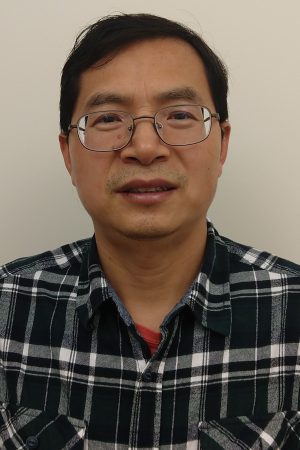Jun Wang

Jun Wang
Dr. Jun Wang received his Ph.D. in Analytical Chemistry from Wuhan University, China in 2000 and was subsequently awarded a scholarship from DAAD, Germany (2000-2001). Then, he pursued his postdoc research in the California State University at Los Angeles (LA) and the University of California at LA, respectively (2001-2005). He jointed Pacific Northwest National Laboratory (PNNL) as a scientist (2005-2011). After that, Dr. Wang moved to Charlotte, NC and founded a start-up company (Nanodiagnostic Technology, LLC) in 2011 and served as the president there (2011-present). Since October 2019, Dr. Wang became a Research Professor at the Department of Bioinformatics and Genomics at the University of North Carolina at Charlotte. Dr. Wang’s research is focused on developing nanotechnology-based assays, chemo/biosensors, and biosensor informatics for a number of applications including early detection of diseases, environmental and occupational biomonitoring, and food safety monitoring.
- Ph.D. in Analytical Chemistry, Wuhan University, China (2000)
- Postdoctoral researcher, Rostock University (Germany), California State University, University of California at Los Angeles (2000-2005)
- Scientist, Pacific Northwest National laboratory (2005-2011)
- President, NanoDiagnostic Technology, LLC (2012-present)
- Professor, University of North Carolina at Charlotte (2009-present)
LAB TITLE
Lorem ipsum dolor sit amet, consectetur adipiscing elit, sed do eiusmod tempor incididunt ut labore et dolore magna aliqua. Ut enim ad minim veniam, quis nostrud exercitation ullamco laboris nisi ut aliquip ex ea commodo consequat.
OPEN POSITIONS
Postdoctoral Associates
- 1 position is available.
Graduate Students
- Welcome highly motivated graduate students with training in chemistry, nanoscience & nanotechnology, biological sciences, bioengineering, or computer sciences.
Undergraduate Students
- Undergraduate students who are interested in biosensor and informatics technology are welcomed to apply for RA positions.
LAB MEMBERS
CURRENT LAB MEMBERS
Yu Sun, Ph.D., Postdoctoral researcher
- Yu received his Ph.D. in Material Engineering and currently works on the development of lateral flow assay-based biosensors and electrospinning fabrication of functional nanofibers.
Kayla Lenz, Ph.D. Student
- Kayla received his B.S. in Mechanical Engineering and is pursuing her Ph.D. degree in Engineering. Kayla works on the development of novel nanomaterials for capturing and detecting COVID-19 virus.
Pavuluri Swetha, MS student
- Swetha received her B.S. in electronics and communication engineering and is pursuing her MS in computer science. Swetha works on the development of mobile apps for lateral flow assay devices.
Hussian Maanaki, Ph.D. student
- Hussian obtained his B.S. in Mechanical Engineering and is pursuing his Ph.D. degree in Bioinformatics and Computational Biology. Hussian works on the development of smartphone-nanosensor-cloud platform for environmental monitoring and biomonitoring and screening of chronic kidney diseases.
Aarush Jugdar, high school student summer intern
- Aarush is a student from North Carolina School of Science and Mathematics (NCSSM).
Joyce Wang, high school student summer intern
- Joyce is a student from Hickory Grove Christian High School
PAST LAB MEMBERS
- Paul Collop, MS Bioanalytical Chemist
- Letice Bussiere, MS Research associate
- Jinghua Ge, Ph.D., Postdoctoral researcher
- Casey Chason Undergraduate student
- Robert Gutirrez Undergraduate student
- Yasa Shirish, Undergraduate student
RESEARCH
My research group is focused on the application of nanotechnology, smartphone technology, and informatics technology to the development of novel portable or wearable chemo-/biosensor device systems for environmental and food monitoring, occupational biomonitoring, and disease diagnostics. The major goals of the research are to address the problems that are associated with current sensing/assay technologies including low sensitivity, high cost, low automation, no data shareability, or short of wearability or portability and to meet the requirements of sensing technology in the real world for home or in-field real-time measurements. This group is interdisciplinary with different expertise in the area of chemistry, biology, material science, nanotechnology, microfabrication, bioengineering, and computational informatics.
RESEARCH INTERESTS
- Synthesis and characterization of functional nanomaterials
- Nanotechnology-based optical / electrochemical chemo-/biosensor design and instrumentation
- Nanomaterial-enhanced lateral flow assays and smartphone reader
- Integrated smartphone-nanosensor-cloud platform
- Integrated microfluidics-nanosensor systems for multiplexed detection
- Mobile health technology
APPLICATIONS
- Environmental monitoring (in water, air, indoors, and soils, ) and food safety monitoring
- Environmental /occupational health monitoring and assessment
- Pathogen detection and screening
- Invasive or minimally-invasive point-of-care screening/diagnostics
- Precision health and precision environmental health
- mitigation of pollutants and pathogens in the environment and indoors